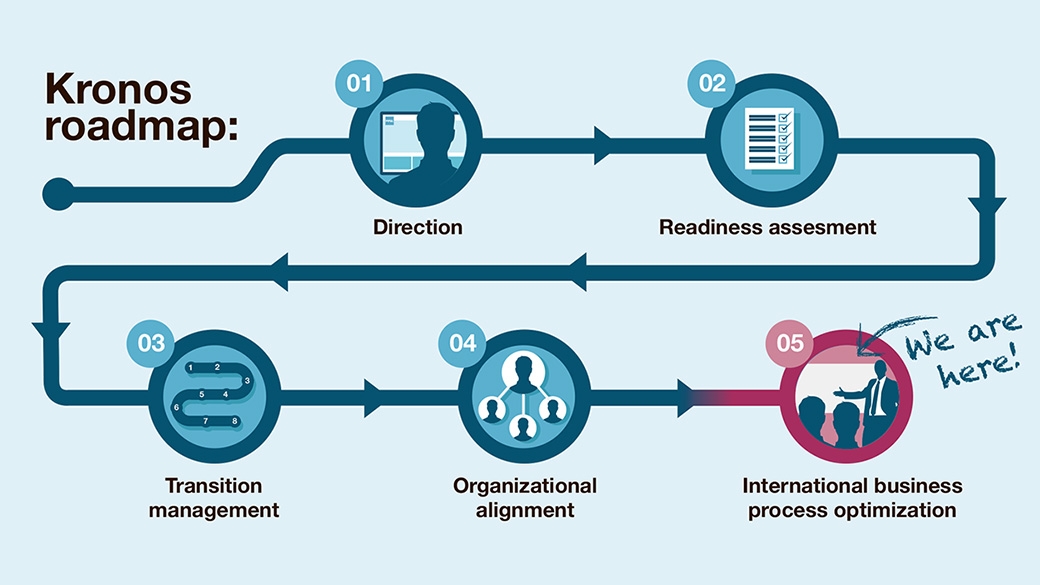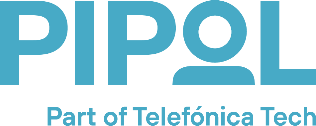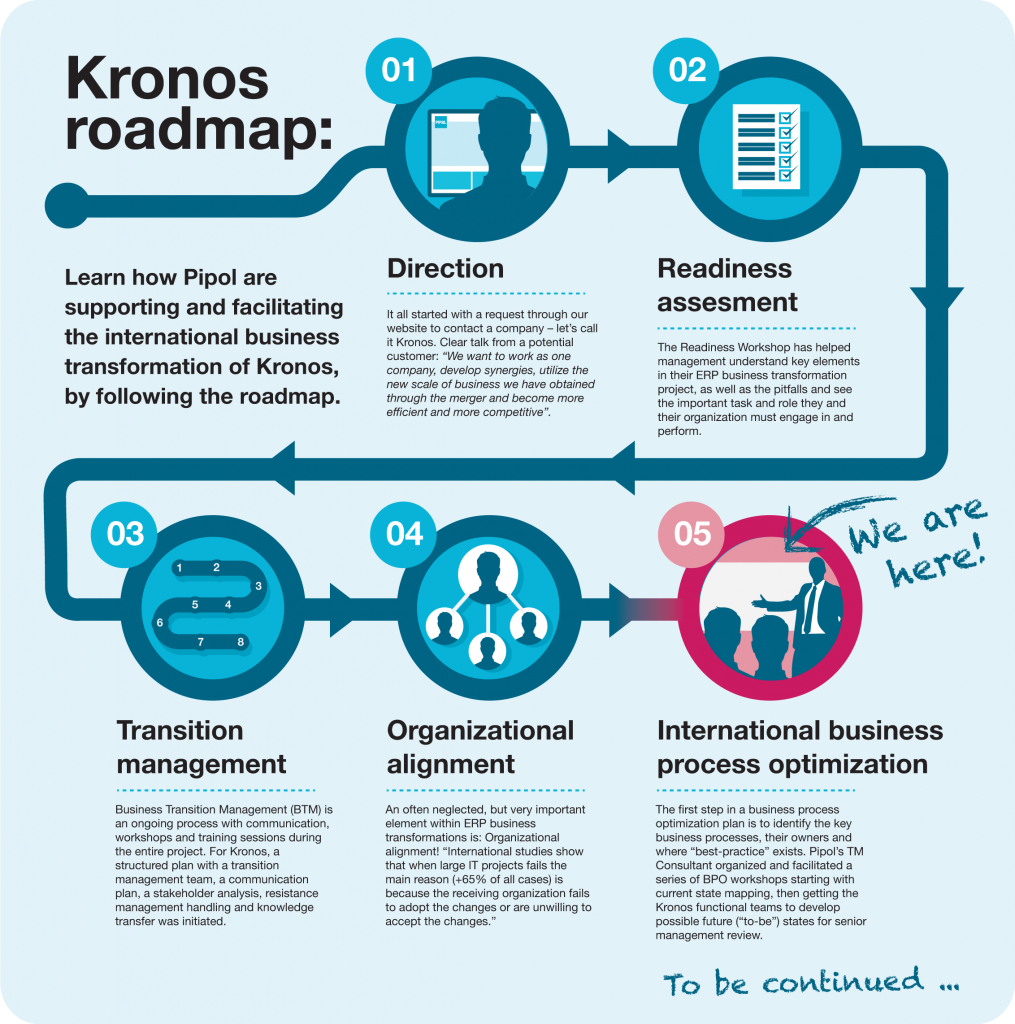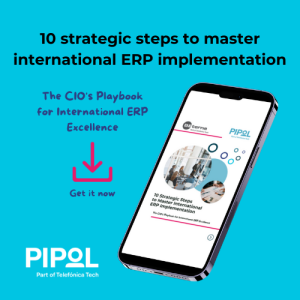ERP Roadmap for an International Business Process Optimization

Part 5: A 12 Country Business Transformation and International ERP Challenge…
This is Business Process Optimization on an international scale. A proven ERP roadmap. How did Pipol go about it in an organisation like Kronos? Pipol’s TM Consultant organized and facilitated a series of BPO workshops starting with current state mapping, then getting the functional teams of Kronos to develop possible future (“to-be”) states for senior management review.“We want to work as one company, reorganize and develop synergies between our different subsidiaries, improve our competitiveness and be much more agile and efficient than we have been so far”.
The US business unit made one of their Kaizen trained Operations Managers available to work with Pipol’s TM Consultant to assist in the planning, as well as to attend and assist in facilitating the proposed international functional workshops. The TM team spent 2 weeks on WebEx and individually preparing for the BPO sessions, capturing existing Kronos matrix’s, exploring best-practice KPI’s and discussing best-practice ERP functionality.
The workshops were to be held over a 6-week period alternating between the New York and Munich offices with functional leader attendees from each of the main locations. Following, the Readiness Assessment and confirmed in the telephone interviews, the Kronos Senior Management team agreed that there should be 4 workshops targeted at the main business functions. 2 weeks later, Pipol’s TM Consultant arrived in New York armed with flow-chart paper, pens and sticky paper pads with a copy of Visio on his laptop:
1) FINANCE – Record to report (R2R)
The Kronos Group Chart of Accounts (GCOA) and the need for timely and consistent reporting was the starting point for the Finance workshop. Current and future-state reviews showed the need for ERP standardization, account mapping capability, standardization of Reporting Dimensions and export to Kronos existing financial consolidation application. The workshop identified specific local GGAP and reporting bottle-necks and set itself (and the other workshops) the target to reduce monthly closure time from 8 days to 3 days.
2) SALES – Bill to cash (B2C)
This workshop showed some significant differences in approach between in the 2 companies approaches. Although, both companies employed a mix of direct and distributor based channels, their sales-force automation, web presence and salesforce motivation approaches were quite different. Both approaches were analysed and discussed. The Senior Management team had decided to transition the merged businesses towards the US business model, which was generally accepted. Good discussions took place about product availability, e-invoicing and SEPA requirements as well as the possibility to use Credit Management and T&E software tools, Credit card payments and Shared Services Center opportunities.
3) PURCHASING – Purchase to pay (P2P)
Direct purchasing was in all cases managed by MRP functionality in the different ERP systems. The workshops focused on A, B, C categorization and possible production “pull” as well as “push” techniques. The importance of ensuring optimum supplier delivery and quality performance was emphasized as well as exploring different inventory & logistics models. The group also reviewed the indirect purchasing profile with a view to minimize spend through supplier rationalization as well as means to reduce tranzactional costs. Industry P2P portals were discussed and a working party established to explore medium-term deployment opportunities.
4) OPERATIONS
The Operational units fell into 2 types, namely those in USA, Germany & China that had large facilities and assets for major product build and the smaller units designed for product finishing to local customer specification. All the major facilities had implemented best-practice manufacturing techniques, KPI performance differed significantly. The workshop agreed that an Operations best-practice team should be established to optimize each unit performance and to maximize overall effectiveness through systems rationalization and inter-site data flows and integration. The focus for the finishing units were on flexibility and stock optimization, also using A, B, C categorization principles. The Operations team gave valuable insight into the forecasting, demand planning and logistics requirements of the other workshops.
The 4 workshops were successful in identifying significant business process differences between the 2 businesses and with the benefit of BPO best-practice knowledge and preparation supported by industry benchmark data, improvement opportunities and a well-motivated Kronos TM team were established.
Departmental/Time based to-be process maps were created and iterated during each of the workshops. Functional leaders were tasked with documenting and circulating to their colleagues in the individual business units for more in-depth review and feedback to the TM team. The TM team presented the workshop findings and recommendations to Kronos Senior Management. The supporting Kronos TM initiative was presented by the TM team and was approved for next phase.
In the last step of this ERP roadmap the following program deliverables were agreed:
- 100% GCOA implementation
- Standardised Finance master data
- All locations to report through existing consolidation application
- Finance working party to establish R2R targets and time-plan
- European Shared Service Centre working party
- Sales USA best-practice implementation in Europe
- Implementation of Credit Management software
- P2P working group to evaluate web-based T&E and in-direct purchasing options
- Operations on-time delivery/inventory optimisation initiative
- TM team tasked to establish and facilitate the Kronos functional teams
Here is an infographic of our complete ERP roadmap we made for Kronos:
Check out the four other parts of this international ERP case story:
- Part 1: A 12 Country Business Transformation and International ERP Challenge
- Part 2: Dealing with Transition Management In Multi-Country ERP Deployment
- Part 3: Leadership Alignment in a Multi-Cultural Organization While Deploying ERP
- Part 4: International Business Process Optimization
- Part 5: ERP Roadmap for an International Business Process Optimization (this)






